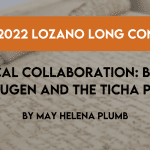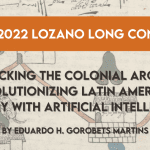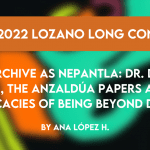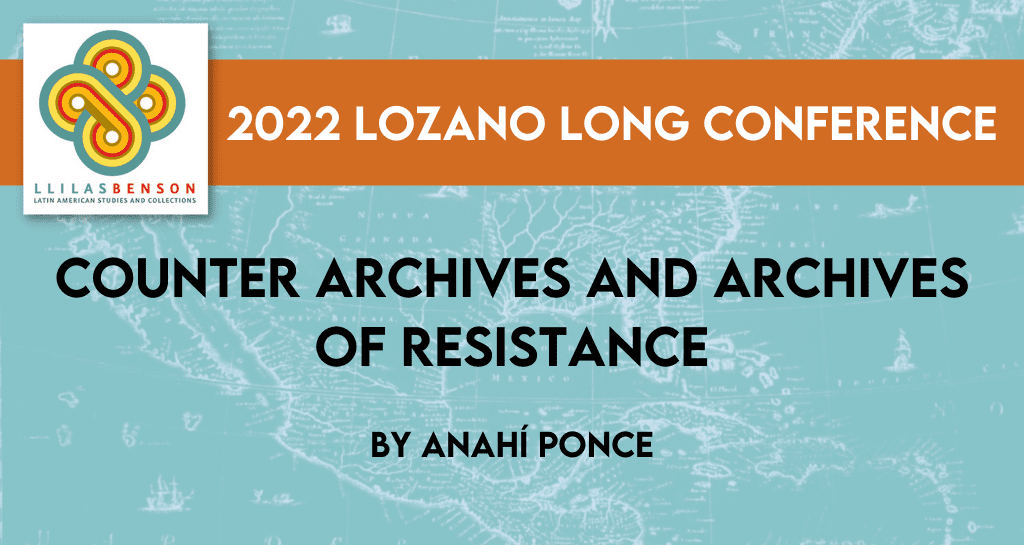
By Anahí Ponce
In honor of the centennial of the Nettie Lee Benson Latin American Collection, the 2022 Lozano Long Conference focuses on archives with Latin American perspectives in order to better visualize the ethical and political implications of archival practices globally. The conference was held in February 2022 and the videos of all the presentation will be available soon. Thinking archivally in a time of COVID-19 has also given us an unexpected opportunity to re-imagine the international academic conference. This Not Even Past publication joins those by other graduate students at the University of Texas at Austin. The series as a whole is designed to engage with the work of individual speakers as well as to present valuable resources that will supplement the conference’s recorded presentations. This new conference model, which will make online resources freely and permanently available, seeks to reach audiences beyond conference attendees in the hopes of decolonizing and democratizing access to the production of knowledge. The conference recordings and connected articles can be found here.
En el marco del homenaje al centenario de la Nettie Lee Benson Latin American Collection, la Conferencia Lozano Long 2022 propició un espacio de reflexión sobre archivos latinoamericanos desde un pensamiento latinoamericano con el propósito de entender y conocer las contribuciones de la región a las prácticas archivísticas globales, así como las responsabilidades éticas y políticas que esto implica. Pensar en términos de archivística en tiempos de COVID-19 también nos brindó la imprevista oportunidad de re-imaginar la forma en la que se llevan a cabo conferencias académicas internacionales. Como parte de esta propuesta, esta publicación de Not Even Past se junta a las otras de la serie escritas por estudiantes de posgrado en la Universidad de Texas en Austin. En ellas los estudiantes resaltan el trabajo de las y los panelistas invitados a la conferencia con el objetivo de socializar el material y así descolonizar y democratizar el acceso a la producción de conocimiento. La conferencia tuvo lugar en febrero de 2022 pero todas las presentaciones, así como las grabaciones de los paneles están archivados en YouTube de forma permanente y pronto estarán disponibles las traducciones al inglés y español respectivamente. Las grabaciones de la conferencia y los artículos relacionados se pueden encontrar aquí.
Dr. Carolina Villarroel is a scholar, archivist, and the director of research for the Recovering the U.S. Hispanic Literary Heritage Project at the University of Houston. Dr. Villarroel is a co-founder of the first U.S. Latino Digital Humanities Center, also based at the University of Houston through Arte Público Press, one of the oldest and most prestigious editorial houses for Latinx scholarship in the country.

The occasion of the Lozano Long Conference gave me the opportunity to learn more about Dr. Carolina Villarroel’s work. I was pleased to learn how much of her long-term projects resonate with my own research interests, especially with respect to understanding the intersections between social justice movements and digital humanities work.
My discussion with Dr. Villarroel was significant not only because of our shared research interests, but because it reminded me of why I decided to enter the academy in the first place – to disrupt it. In speaking with Dr. Villarroel, I was reminded that the scope of the work we do is never so much about ourselves and our respective careers, but rather it is part of a larger historical legacy of trailblazers who have spent their lives advocating for and with their communities. Simply put, it is a collective project. One that overlaps generations, one that is continuously growing, and one that we are tasked with keeping alive through these disruptions and the community we bring with us to do that work. We both are committed to working alongside Latinx students, and cultivating the next generation of students, historians, and activists through this much needed work.
Dr. Villarroel came to the U.S. nearly 25 years ago from Chile, and shortly after received both of her degrees from the University of Houston. She then went on to work as a researcher and archivist at the Houston Metropolitan Research Center, working specifically with Mexican American and African American histories before returning to the University of Houston to work for the Recovering the U.S. Hispanic Literary Heritage Project. In her capacity as director, she works alongside high school, undergraduate and graduate students in offering them the training and resources needed for them to become contributors to the program.
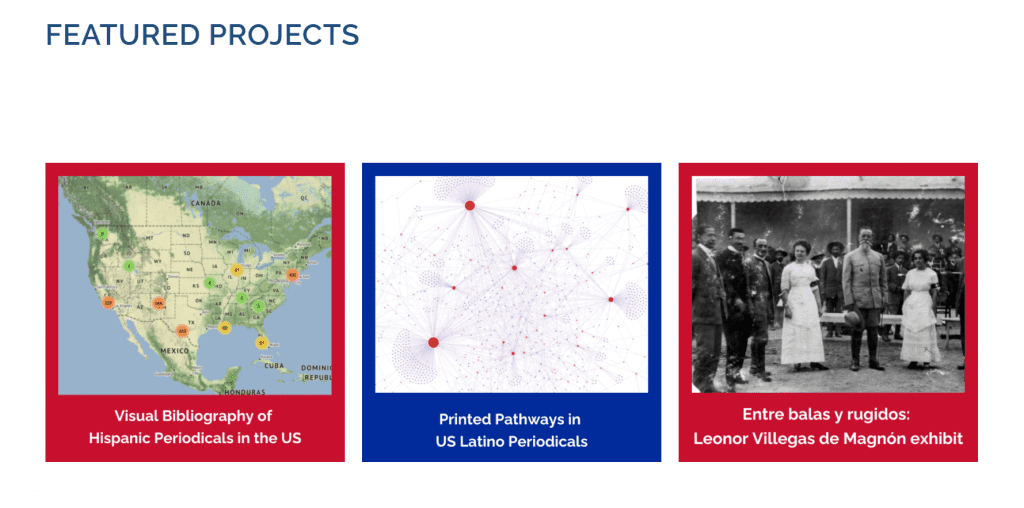
One of these projects includes an elementary school pilot program aimed at assisting 4th- and 5th-grade students with creating digital timelines as a project for their school. However, Dr. Villarroel’s work with the Recovering the U.S. Hispanic Literary Heritage Project was the focus of most of our discussion. The project has multiple initiatives. These include the digitization of maps, newspapers, and other materials dating from the colonial period up until 1960. It is through this work that Villarroel helps students learn about digital archiving so that they also might serve as contributors to these projects. Most recently, the program received a grant to digitize over 200 newspapers from both sides of the U.S.-Mexico border. With the resources from this grant Dr. Villarroel will continue to train students in digital humanities methods by teaching them how to digitize materials, while also working alongside web developers who will bring these projects to life online.
Along with discussing the importance of passing the baton to the next generation of scholars and activists, another common theme that came up in our conversation was the necessity of creating spaces for communities to properly document their histories, as such histories are often left out or erased from more traditional archives. Throughout her career, Dr. Villarroel has consistently aligned the purpose of her work with these ideals and has structured her work in direct response to these gaps. It is with this in mind, that also discussed the importance of counter archives and archives of resistance that are achievable through digital humanities projects. Counter archives are separate from conventional archives in the ways in which they are able to document and preserve materials that rarely make it into the traditional archival spaces. Counter archives by their very nature tend to be viewed as illegitimate, for not performing the “right” kind of work (i.e., work that is legible to predominantly white and middle-class audiences). A significant component of Dr. Villarroel’s work has been precisely to disrupt normativity such that counter archives can be legible to broader audiences
My own research centers on the work of U.S.-Mexico borderlands activists, looking specifically to how they create and position themselves and their organizing work through their social media platforms. I have come to look at these online postings (which are often evoked through the use of nontraditional methods of advocacy such as memes and popular culture), as “counter archives” in and of themselves. I look especially at the ways in which these digital spaces document in unprecedented ways the state of grassroots initiatives on the border during the time of COVID, Trump era border policies, and a myriad of other historical events. In discussing this work with Dr. Villarroel, she was able to offer me extraordinary insight into the function of respectability politics in both my work and her own.
For more about Dr. Villarroel’s work, see her presentation, “Archivist and Digital Humanities Expert. Latinx Arte Público Press” at the Lozano Long Conference in February of 2022. Here Dr. Villarroel discusses the larger scope of her work in addition to the importance of making materials accessible online for the next generation of students to write, theorize, and dream about possibilities for resistance, for years to come.
Anahí Ponce (she/they) is an El Paso native, writer, and scholar. She received a Bachelor of Arts in English and American Literature from the University of Texas at El Paso in 2020. She is currently a second year doctoral student in the department of Mexican American and Latina/o Studies at the University of Texas at Austin. Their research is interested in coalition building and activism along the U.S.-Mexico Borderlands, as well as analyzing how activist groups navigate identity and respectability politics via digital organizing.
The views and opinions expressed in this article or video are those of the individual author(s) or presenter(s) and do not necessarily reflect the policy or views of the editors at Not Even Past, the UT Department of History, the University of Texas at Austin, or the UT System Board of Regents. Not Even Past is an online public history magazine rather than a peer-reviewed academic journal. While we make efforts to ensure that factual information in articles was obtained from reliable sources, Not Even Past is not responsible for any errors or omissions.
